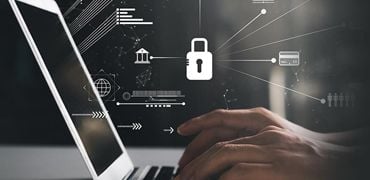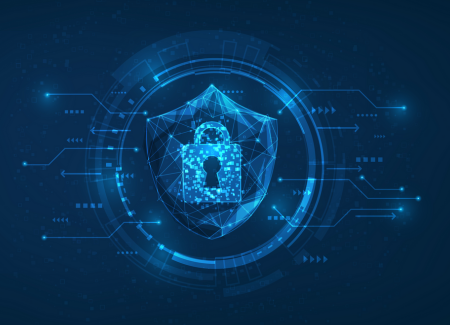What is Digital Security and How Can You Make a Great Career in it

In a digital ecosystem, a large part of our lives — both personal and professional — are online. Starting from banking transactions, bill payments to social planning, and even working remotely, almost everything is over the internet. Along with the convenience it offers, being connected to digital networks 24 by 7 has its own set of problems. Cybercrime is one of these problems that ranks right at the top in terms of impact. The global cost of cybercrime is expected to grow by 15% annually over the next five years, reaching $10.5 trillion annually by 2025, up from $3 trillion in 2015. Therefore, the question — of what is digital security — is a very relevant one.
In this guide, we’ll explore, ‘what is digital security’ and how it can be a great career opportunity for you as organizations around the world brace against the rising cybercrime rate.
What is Digital Security?
The method employed to safeguard a company’s online identity is known as digital security.
Web services, antivirus programs, smartphone SIM cards, biometrics, and encrypted personal devices are some of the tools used in protecting sensitive information and other valuable assets related to personal or organizational identity.
Why is Digital Security Important?
With the sheer amount, value, and variety of data available online, cybercriminals can use any breaches in security for nefarious purposes. Hackers benefit from a stolen identity or a hacked credit card with a big balance to burn up if they can trick just one customer. Such phishing attacks can compromise precious customer data and make an organization look very bad. To keep an organization’s own data and that of the customer’s data safe, digital security is the need of the hour.
ALSO READ: What is Cybersecurity Culture and Why is it Important for Companies?
What Kind of Information is Considered a Digital Security Risk?
 Not all of a company’s information is valuable to cybercriminals. So, let’s understand what kind of data is at risk so we can take effective steps to secure those.
Not all of a company’s information is valuable to cybercriminals. So, let’s understand what kind of data is at risk so we can take effective steps to secure those.
1. Personal Identification Information
Social engineering and identity theft frequently include the use of personal data. An individual’s name, phone number, address, email address, IP address, location, and social security number are among the most damaging information collected by cyber criminals.
2. Personal Payment Information
Any information pertaining to financial transactions is regarded as personal payment data. These details include account and routing numbers for internet banking, credit and debit card numbers, and PIN numbers. Hackers with access to online banking credentials of individuals can withdraw money from their accounts or make transactions.
3. Personal Health Information
Personal Health Information (PHI) includes details about an individual’s medical history, prescription drug use, health insurance coverage, and doctor and hospital visits. This information is a gold mine for high-rolling cybercriminals as they may use it to order and resell prescription medicines, and submit fraudulent insurance claims.
How Does Digital Security Work?
We have developed a checklist for making digital security work by establishing a solid ecosystem for online privacy and digital safety. The following steps include:
1. Set priorities
- List the most crucial digital assets you have
- Examine the extent to which you are personally exposed via apps, internet accounts, and mobile devices
- Identify the potential disclosure points for your social security number, health insurance information, and driver’s license information
2. Protect
- Invest in tools and services that protect both your/organization’s online privacy and digital security
- Think about using protection for both your local data (on your devices) and online data (publicly available personal information)
3. Monitor
- By receiving fraud alerts that warn you of suspicious activities, you can protect your/organization’s sensitive information efficiently
- Use these alerts to monitor the exposure and progressively reduce it to prevent potential cyber attacks in the future
4. React
- When you receive warnings, take swift action to preserve your/organization’s security and privacy
- Use caution while purchasing new hardware or subscribing to new services
- Check your/company’s bank statements and credit report regularly for any suspicious activity
ALSO READ: How to Get into Cybersecurity and Make a Successful Career in it
What are the Different Types of Digital Security?
As you can see, if your/organization’s digital data is compromised, a lot can go wrong. Fortunately, there are many different types of security in the digital age, giving users a large selection of defense strategies.
1. Antivirus Programs
Your data may get infected by viruses spread by malware and other harmful systems, which can cause your system to crash. In addition to identifying and eliminating these viruses, an effective antivirus program blocks dubious programs and isolates potential risks.
2. Updated Firewalls
This program keeps track of online traffic, spots authorized users and prevents unauthorized access. Since firewalls have been around for a while, many cybersecurity professionals consider them to be outdated. But, a cutting-edge version is highly beneficial for blocking unauthorized users and safeguarding against next-generation malware.
3. Proxies
By applying filtering criteria that adhere to an organization’s IT regulations, proxies act as a link between users and the internet. Proxies use an authentication system to limit access and track usage while blocking hazardous websites.
4. Remote Monitoring Software
The data security team can gather data, identify issues, and manage all the software and hardware from a distance with remote monitoring. Administrators can fix any problem at any time and from any location because of the flexibility and simplicity that remote monitoring offers.
6. Vulnerability Scanner
This program analyzes, maintains, and locates any system vulnerabilities within your organization. In addition to identifying weaknesses, vulnerability scanners also prioritize them to assist you in planning your defenses. Scanners can be used by IT security teams for both internal systems and web applications.
What are Some Examples of Digital Security Tools?
 We have discussed ‘what is digital security’, its importance, and various types of digital security, so now let’s explore some specific security tools available to mitigate these online threats.
We have discussed ‘what is digital security’, its importance, and various types of digital security, so now let’s explore some specific security tools available to mitigate these online threats.
1. Instant Message Encryption Tools
A lot of sensitive information may pass through instant messaging. Hence, it is essential to secure our chat conversations. Digital security tools such as Cryph encrypts your Mac or Windows-based web browsers, while ChatSecure enables private encryption for chat messages on Android and iOS smartphones.
2. Navigation Privacy Tools
Hackers can only steal information when they can see them. By setting up a proxy, such as Anonymox, you can protect your identity and surf anonymously by changing your IP address. Tor is another such security tool that isolates every webpage you visit, preventing third-party trackers and ads from tracking you. Additionally, it enables multi-layer encryption, deletes cookies, and clears your browsing history.
The Career Outlook of Digital Security
According to Mckinsey, there are 3.5 million open positions for cybersecurity professionals globally. That clearly indicates that digital security is a trending career right now. To have a career in digital security, you can explore Emeritus’ world-class online cybersecurity courses to boost your skill set.
Write to us at content@emeritus.org











